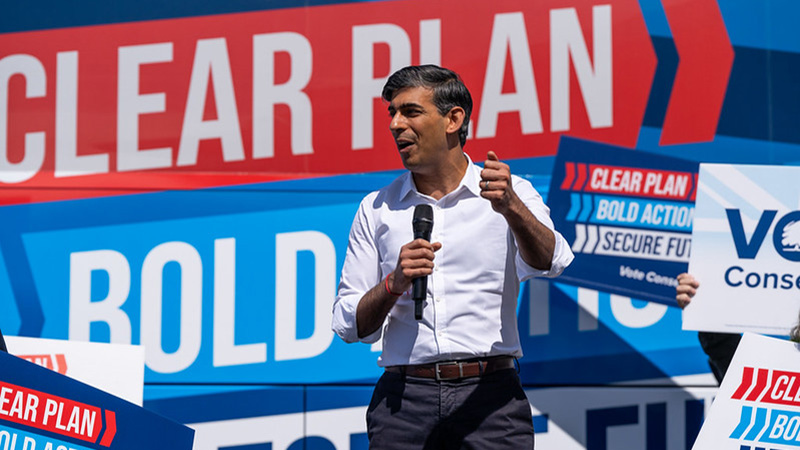Cuts to National Insurance formed a key part of the Conservative manifesto, unveiled by prime minister Rishi Sunak at Silverstone today (11 June).
At the launch, Sunak promised a further two percentage point cut to NI should his party be re-elected on 4 July.
The Conservatives cut NI by 2% as part of chancellor Jeremy Hunt’s Spring Budget in March.
“With the election clock ticking the Tories must attempt a last throw of the dice and while so far, their cuts to National Insurance have had a lukewarm reception they have once again stated that they plan to cut NI by another 2p,” Shaun Moore, tax and financial planning expert at Quilter said.
“The headline figure is that someone earning £50,000 today will be £749 better off under the proposed rules set to be announced in the manifesto. Similarly, someone on around the average salary in the UK of £35,000 will be £449 better off per year. Whether this turns the dial enough for a party that is lagging badly behind in the opinion polls is yet to be seen.
“This may be a case of too little, too late. The reality is that many people are looking to the difficulties that public services are facing at the moment and wondering how such a tax cut like this will impact the NHS, schooling and other state support. Balancing individual financial relief with the sustainability of public services will be key in ensuring this change benefits the broader society if the party has the chance to enact it.
“It is important to remember too that this change gives nothing to pensioners who do not pay national insurance. The Conservatives will be hoping that the ‘Triple Lock Plus’ policy, which pledges not to the tax state pension, gives pensioners enough to stop them feeling hard done by.”
See also: Labour drops plans to reintroduce lifetime allowance
Laura Suter, director of personal finance at AJ Bell, added that the party was sticking to its previous playbook of focusing on cutting National Insurance, rather than making other changes to taxes.
“While it’s done little to move the needle when it comes to voter enthusiasm for the Conservatives, the party clearly feels that having the headline of ‘abolishing National Insurance’ is a stronger message than tinkering with income tax rates. But voters will have to wait for this handout, with the Conservatives only pledging to make the cut from April 2027.
She added: “But lower earners won’t be celebrating the move. Someone on £15,000 a year will save less than £50 a year on their National Insurance bill if the plans see the light of day.
“The highest earners will be feeling short-changed too, as someone on £100,000 a year will save the same amount as someone earning half that salary. While some may struggle to muster up much sympathy for those earning six-figures, this move would have a huge impact on single earner households. A couple each earning £50,000 a year will see their combined National Insurance bill cut by almost £1,500 a year but a sole earner on £100,000 will only save £754 a year.
“Also missing out are those above state pension age and earning less than the National Insurance threshold of £12,570, who would see no difference from the proposed cut. The reason that a cut to National Insurance is cheaper than the same cut to income tax is because it benefits fewer people. Those over state pension age don’t pay National Insurance, whereas they do pay income tax.
“The other uncomfortable fact is that while these are tax cuts, the Tories have also presided over a huge increase in income taxes thanks to the freeze on income tax allowances during a period of high inflation. That freeze is set to remain until 2028. While most of the nation’s National Insurance bills would be lower after the proposed cuts, for many their total tax bills will still be higher than if the government had never introduced the income tax band freeze.”










